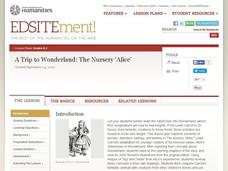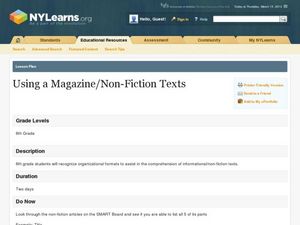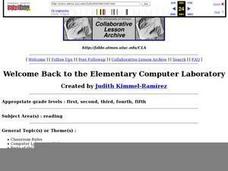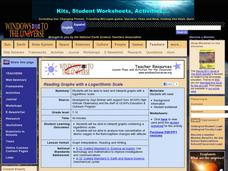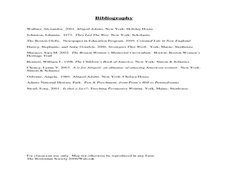Curated OER
A Trip to Wonderland: The Nursery "Alice"
Primary learners explore elements of wonder in The Nursery "Alice" by Lewis Carroll. They analyze the plot point after listening to the text. Next, they describe the imagery in various works of children's literature using the given links...
Curated OER
Using a Magazine/Non-Fiction Texts
Working with magazine articles and other informational texts, students identify the parts of a non-fiction work. The learners use SMART board files to guide instruction, as well as a transition to writing their own non-fiction article in...
Curated OER
Voice and James Joyce
After reading a text written by James Joyce, middle and high schoolers find examples of passive voice. They share their findings with the class. Use this lesson to emphasize the effect of passive voice in writing.
Curated OER
Welcome Back to the Computer Lab: Starting a New School Year
Get kids re-oriented to the computer lab for back-to-school. The constructivist approach in this session allows children to exert ownership of their behavior in the computer lab. Read aloud a few books about good and poor manners, as...
Curated OER
What are the Elements of Poetry
Students read the poem "Ode to Pablo's Tennis Shoes" and analyze the form, figurative language, and mood. They complete a T-chart containing what they have learned about Pablo and the evidence from the poem supporting their conclusions.
Curated OER
The Young Basketball Player
Students explore the history of basketball by reading and listening to a book entitled, "The Young Basketball Player." Afterwards, they create a trivia basketball game and write an interview for their favorite player. As a...
Curated OER
"Leap, plashless": Emily Dickinson & Poetic Imagination
Students examine different poems from Emily Dickinson. They practice listening for meter in the poems and make connections between the texts. They also practice their own creative writing skills.
Curated OER
Breaking up a Poem
Seventh graders break down the barriers in reading, speaking, listening, writing and understanding poetry. As a whole group, they establish their own criteria for line breaks by discussing questions and taking notes on a PowerPoint...
Curated OER
A Lesson in Biodiversity: Making Comparisons Between Defensive Mechanisms Utilized by Marine Organisms
If your upper elementary or middle school marine biology learners are going to visit an aquarium, then here is a field trip activity guide for you. It is written specifically for The Maritime Aquarium, but the idea can be adapted to any...
Curated OER
Review of Literary Devices
Sixth graders review literary devices. They use both fiction and nonfiction texts to review metaphor, simile, alliteration, imagery, symbolism and personification. This lesson has a scripted guide for the teacher to follow.
Curated OER
Reading Graphs with a Logarithmic Scale
Guide high school meteorologists through a detailed examination of oxygen concentration data. The learners analyze a line graph containing logarithmic data and employ the use of a graphing calculator. A comprehensive worksheet and links...
Curated OER
Essay Writing
Are your learners working towards their GED? First they study the GED essay rubric, and then they read a sample essay as a group. After studying the basic elements, they write an essay of their own. After peer editing, they revise their...
Curated OER
Splash
Students participate in a lesson that develops skills of reading comprehension. They work on the skills of using context and picture clues to derive meanings of words. The lesson concentrates on the high-frequency words of we, to,in, and...
Curated OER
Robin Hood
Fourth graders read and analyze the novel, Robin Hood. They create a vocabulary word map, complete a Venn diagram comparing Robin Hood and Little John, act out a chapter, create a wedding announcement, and write a new epitaph for Robin...
Curated OER
Abigail Adams: Integrating Social Studies and Language Arts
Third graders increase reading strategies while learning about Abigail Adams and her role in history. In this Abigail Adams lesson, 3rd graders read about the American Revolution and Abigail Adams using all the balanced literacy...
Curated OER
Holes
Students read and analyze the story elements of the novel "Holes" by Louis Sachar. They play a "Holes" matching game, complete a timeline of story events, complete a Cause-and-Effect graphic organizer, conduct research on Louis Sachar's...
Curated OER
Volatile Volcanoes
Students explore volcanoes. In this cross curricula lesson, students use the Internet to investigate volcanoes. The series of six lesson guides the students in their search for information, thus building research skills. After all six...
Curated OER
Cloudy With A Chance of Meatballs
Second graders explore weather. In this weather lesson, 2nd graders read Cloudy With A Chance of Meatballs and participate in four supplemental science activities. Students participate in Internet research, create weather maps,...
Curated OER
Memories, A Connection to the Past
Students read four or more books. They make predictions before reading, complete a picture walk, read in partners and complete graphic organizers. Various graphic organizers are provided in English and Spanish.
Curated OER
Animal Coverings
Students read a book. In this animal characteristics instructional activity, students read the book Animal Coverings, answer comprehension questions, and complete a chart where they match animals with their coverings.
Curated OER
The Three Billy Goats Gruff
First graders read key sentences from the story on sentence strips. They read the story with a partner and act out the story, taking turns acting the parts of the various characters.
Curated OER
Missing Toy Writing Activity
Young scholars listen to Knuffle Bunny: A Cautionary Tale, by Mo Willems. In this listening and writing lesson, students listen to the story and create a poster for their favorite toy if it were to go missing. They work independently to...
Curated OER
A World of Myths
Students read and write myths. In this world mythology instructional activity, students read and analyze myths from various cultures and then recognize their attributes as they write their own myths to explain natural phenomena.
Curated OER
Marine Life, Oceans, Lakes and Rivers
Students examine the types of organisms found in oceans. In groups, they read articles about the research done at certain sites. They work together to research their own water ecosystems and report the findings to the class. To end...


